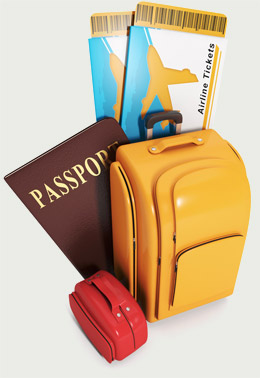
Overcoming jet lag
Posted in Travel Health on July 10, 2012. Last modified on January 31 2018. Read disclaimer.
From algae and molds to fruit flies and fish, living organisms have developed an internal clock (called circadian rhythm) that's imprinted into our genes. (Humans have evolved an additional master clock -- a cluster of cells in our brain whose primary job it is to regulate time.) And the main queue for regulating these internal clocks is daylight -- both as it changes throughout the day and throughout the seasons.
It is their circadian rhythm that tells bears when to hibernate and birds when to migrate.
In humans, the seasonal changes may play a role in Seasonal Affective Disorder but on an hour-by-hour basis, they are mostly subconscious tweaks in body temperature, metabolism, heart function, respiratory rate and the secretion of hormones.
Only when we jet across multiple time zones, causing our internal clock to become out of sync with our environment, does our internal clock become apparent. Our bodies may get confused about when to sleep and awake, sleep becomes fractionated or we're not up to par in terms of concentration, mood, digestion or physical performance. These are all symptoms of what's commonly known as jet lag.
+ Free Shipping & Returns on Eligible Items.
Jet lag mini quiz:
Other tips for minimizing jet lag include:
Assuming that your trip will be for more than just a few days, you may find the following helpful in making the time transition (for very short trips of just a couple days, you may be wise to stick with your at-home routine rather than repeatedly trying to readjust your biological clock.)
Before your trip:
- Start "presetting" your sleep pattern several days before traveling to coincide with the time at your destination. Go to sleep earlier if you will be heading east or later if you'll be traveling west. But keep this within reason. Do not try to skip sleep in order to assure that you'll be tired at your destination.
- Expose your eyes to light (ideally a light box which is many times brighter than normal lights) for several hours around the time you plan to wake up at your destination. Go to sleep with a night-mask or room darkening shades (to assure total darkness) at your new, target bedtime.
- Shift your exercise and meal time to what it will be at the destination.
- Schedule a layover, if possible, to break up a very long flight.
During your flight:
- Set you watch to the destination's time zone when you begin your trip.
- Avoid sleeping during the flight if it wouldn't be a "sleep time" at your destination.
- Stay hydrated as you travel.
Upon arriving at your destination
- Spend plenty of time exposed to natural sunlight to help adjust your internal clock.
- Avoid alcohol as a tool for relaxation or to induce sleep. Alcohol disrupts normal sleep patterns and acts as a stimulant when blood alcohol levels decrease during the night.
- Avoid caffeine other than in the morning. When use as a mid-day pick-me-up, drinking coffee, caffeinated tea or colas may make it harder to sleep come night time. If fatigue is a problem, 20-30 minute naps are preferred.
- Though light and darkness are primary triggers for sleep, fatigue is another. So some people find morning exercise helpful for bringing about evening fatigue.
Resources:
- http://wwwnc.cdc.gov/travel/yellowbook/2012/chapter-2-the-pre-travel-consultation/jet-lag.htm
- http://learn.genetics.utah.edu/content/basics/clockgenes/
- http://www.nlm.nih.gov/medlineplus/ency/article/002110.htm
- http://www.nhlbi.nih.gov/health/public/sleep/yg_slp.htm#jetlag

